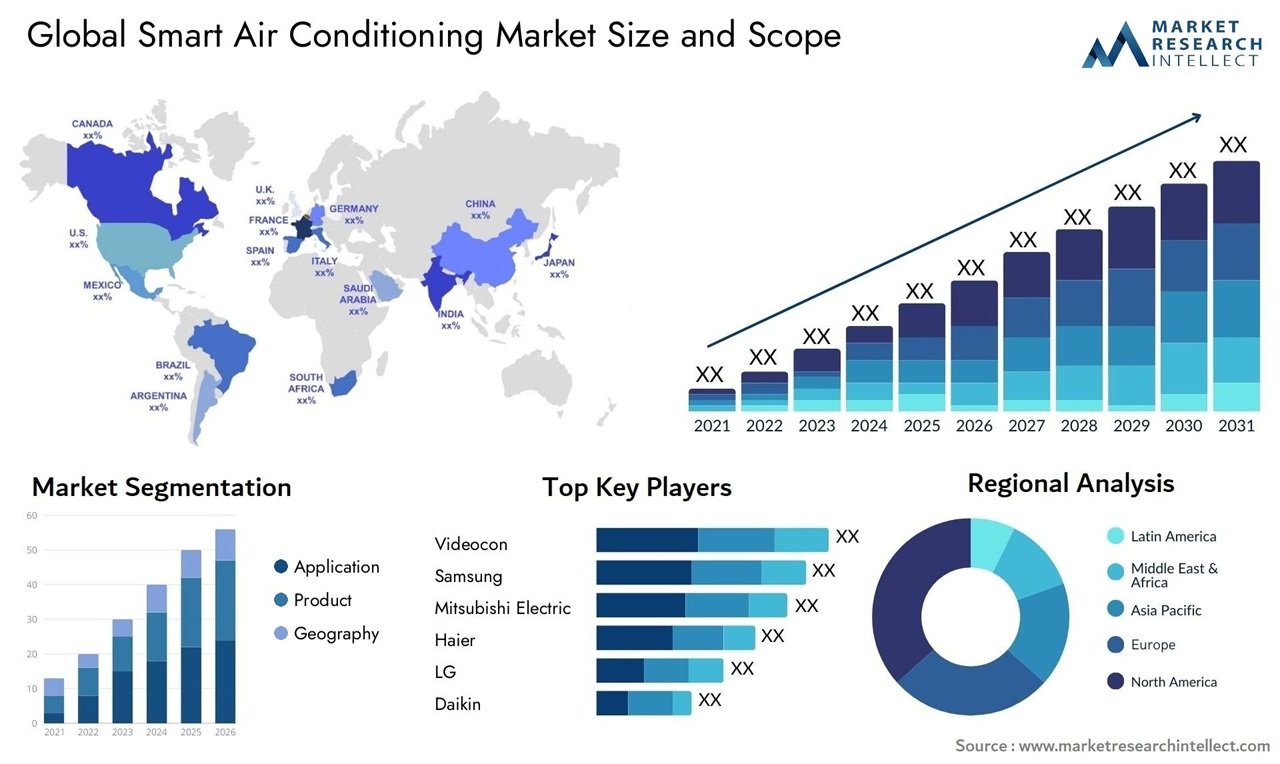Smart Air Conditioning Market to Reach USD 46.39 Billion by 2032
The global smart air conditioning market is projected to grow from USD 17.02 billion in 2024 to USD 46.39 billion by 2032, according to a report by Market Research Intellect. This represents a compound annual growth rate (CAGR) of 13.2% from 2025 to 2032.
Growth is driven by the rising adoption of IoT-enabled HVAC systems, energy efficiency concerns, and increasing demand for home automation. Smart air conditioners allow users to control temperature remotely, monitor energy consumption, and integrate with voice assistants and AI-based systems.
Energy Efficiency and Government Regulations Fuel Demand
Smart air conditioning systems are being adopted to meet stricter energy efficiency standards and reduce carbon emissions. These systems use AI-powered sensors, programmable thermostats, and machine learning to optimize energy use. Integration with smart grids enables real-time monitoring and cost-effective cooling.
Governments are supporting the transition with policies such as Minimum Energy Performance Standards (MEPS), rebates, and tax incentives. Regulatory bodies like the U.S. Department of Energy and the EU’s Ecodesign Directive are enforcing new standards that are influencing both manufacturers and consumers.
AI and IoT Enhance Performance and User Experience
Connected air conditioners with AI and IoT features offer predictive cooling based on user behavior and environmental data. Users can adjust settings via mobile apps or voice commands, while remote diagnostics help reduce maintenance costs and system downtime.
Market Growth Across Residential and Commercial Sectors
In residential markets, smart ACs offer convenience, comfort, and energy savings. Commercial buildings, hotels, and retail spaces benefit from centralized control systems and integration with Building Management Systems (BMS). These tools help monitor HVAC performance and support sustainability targets.
Smart Cities and Sustainable Infrastructure Drive Expansion
Urban development plans are increasingly focused on sustainable infrastructure. Smart city initiatives are incorporating intelligent HVAC systems to reduce emissions and manage electricity use. Some cities are also adopting solar-powered smart AC units and integrating them with renewable energy strategies.
Technological Innovation Shapes Market Evolution
Recent innovations such as inverter and variable refrigerant flow (VRF) technologies, occupancy sensors, and low-GWP refrigerants are improving system efficiency. There is also interest in emerging technologies like blockchain for secure energy transactions and nanotechnology for better thermal management.
Regional Outlook
The Asia-Pacific region leads the market, with countries like China, Japan, and India advancing smart home adoption and energy efficiency. China remains the largest consumer and producer of air conditioners. North America follows, led by the U.S., where IoT-based automation and regulatory pressure are accelerating smart HVAC adoption. Europe sees steady growth due to carbon policies, while the Middle East and Africa show rising demand due to extreme climate conditions.
Key Companies
Major players in the market include Daikin Industries, LG Electronics, Samsung Electronics, Mitsubishi Electric, Panasonic Corporation, Haier Group, Honeywell International, Johnson Controls, Trane Technologies, and Hitachi Air Conditioning. These companies are investing in AI, voice control, and energy-efficient designs to meet growing market needs.
As urbanization, climate change, and technological advancements converge, the smart air conditioning market is expected to play a key role in future energy management and sustainable cooling solutions.
Read More
